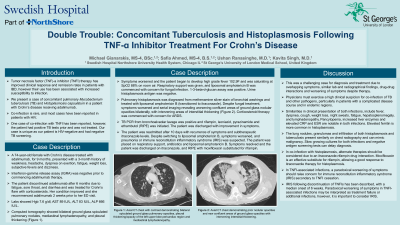Back


Poster Session C - Monday Afternoon
Category: IBD
C0438 - Double Trouble: Concomitant Tuberculosis and Histoplasmosis Following TNF-a Inhibitor Treatment for Crohn's Disease
Monday, October 24, 2022
3:00 PM – 5:00 PM ET
Location: Crown Ballroom

Has Audio
.jpg)
Michael Gianarakis, BSc
St. George's University of London
Chicago, IL
Presenting Author(s)
Michael Gianarakis, BSc1, Ushan A. Ranasinghe, MS, MD2, Safia Ahmed, BS1, Kavita Singh, MD2
1St. George's University of London, Chicago, IL; 2Swedish Hospital, Chicago, IL
Introduction: Tumor necrosis factor (TNF)-a inhibitor (TNFI) therapy has improved clinical response and remission rates in patients with IBD, however their use has been associated with increased susceptibility to infection. We present a case of concomitant pulmonary Mycobacterium tuberculosis (TB) and Histoplasmosis capsulatum in a patient with Crohn’s disease receiving Adalimumab. Co-infection is rare, and most cases have been reported in patients with HIV. One case of co-infection with TNFI has been reported, however, the patient had positive TB tests prior and was not treated. Our case is unique as our patient is HIV-negative and had negative TB screening.
Case Description/Methods: A 74-year-old female with Crohn’s disease treated with Adalimumab, for 9 months, presented with a 3-month history of weakness, headache, dyspnea on exertion, fatigue, weight loss, subjective fevers and dizziness. Labs showed Hgb 7.6 g/dl, AST 89 IU/L, ALT 83 IU/L, ALP 666 IU/L. Computed tomography showed bilateral ground glass spiculated pulmonary nodules, mediastinal lymphadenopathy, and pleural thickening. Pulmonary histoplasmosis was diagnosed from methenamine silver stain of bronchial washings and treated with liposomal amphotericin B (transitioned to itraconazole). After worsening symptoms, TB PCR from bronchoalveolar lavage was positive and rifampin, isoniazid, pyrazinamide and ethambutol (RIPE) was initiated. The patient was readmitted after 10 days with recurrence of symptoms and subtherapeutic itraconazole levels. Despite switching to liposomal amphotericin B, symptoms worsened, and pneumonia or immune reconstitution inflammatory syndrome was suspected. The patient was placed on respiratory support, antibiotics and liposomal amphotericin B. Symptoms resolved and the patient was discharged on itraconazole, and RIPE with moxifloxacin substituted for rifampin.
Discussion: This was a challenging case for diagnosis and treatment due to overlapping symptoms, similar lab and radiographical findings, drug-drug interactions and worsening of symptoms despite therapy. Physicians must exercise a high clinical suspicion for co-infection of TB and other pathogens, particularly in patients with a complicated disease course and in endemic regions. In co-infection with histoplasmosis, alternate therapies should be considered due to an itraconazole-rifampin drug interaction. In TNFI-associated infections, a paradoxical worsening of symptoms should raise concern for immune reconstitution inflammatory syndrome secondary to TNFI cessation.
Disclosures:
Michael Gianarakis, BSc1, Ushan A. Ranasinghe, MS, MD2, Safia Ahmed, BS1, Kavita Singh, MD2. C0438 - Double Trouble: Concomitant Tuberculosis and Histoplasmosis Following TNF-a Inhibitor Treatment for Crohn's Disease, ACG 2022 Annual Scientific Meeting Abstracts. Charlotte, NC: American College of Gastroenterology.
1St. George's University of London, Chicago, IL; 2Swedish Hospital, Chicago, IL
Introduction: Tumor necrosis factor (TNF)-a inhibitor (TNFI) therapy has improved clinical response and remission rates in patients with IBD, however their use has been associated with increased susceptibility to infection. We present a case of concomitant pulmonary Mycobacterium tuberculosis (TB) and Histoplasmosis capsulatum in a patient with Crohn’s disease receiving Adalimumab. Co-infection is rare, and most cases have been reported in patients with HIV. One case of co-infection with TNFI has been reported, however, the patient had positive TB tests prior and was not treated. Our case is unique as our patient is HIV-negative and had negative TB screening.
Case Description/Methods: A 74-year-old female with Crohn’s disease treated with Adalimumab, for 9 months, presented with a 3-month history of weakness, headache, dyspnea on exertion, fatigue, weight loss, subjective fevers and dizziness. Labs showed Hgb 7.6 g/dl, AST 89 IU/L, ALT 83 IU/L, ALP 666 IU/L. Computed tomography showed bilateral ground glass spiculated pulmonary nodules, mediastinal lymphadenopathy, and pleural thickening. Pulmonary histoplasmosis was diagnosed from methenamine silver stain of bronchial washings and treated with liposomal amphotericin B (transitioned to itraconazole). After worsening symptoms, TB PCR from bronchoalveolar lavage was positive and rifampin, isoniazid, pyrazinamide and ethambutol (RIPE) was initiated. The patient was readmitted after 10 days with recurrence of symptoms and subtherapeutic itraconazole levels. Despite switching to liposomal amphotericin B, symptoms worsened, and pneumonia or immune reconstitution inflammatory syndrome was suspected. The patient was placed on respiratory support, antibiotics and liposomal amphotericin B. Symptoms resolved and the patient was discharged on itraconazole, and RIPE with moxifloxacin substituted for rifampin.
Discussion: This was a challenging case for diagnosis and treatment due to overlapping symptoms, similar lab and radiographical findings, drug-drug interactions and worsening of symptoms despite therapy. Physicians must exercise a high clinical suspicion for co-infection of TB and other pathogens, particularly in patients with a complicated disease course and in endemic regions. In co-infection with histoplasmosis, alternate therapies should be considered due to an itraconazole-rifampin drug interaction. In TNFI-associated infections, a paradoxical worsening of symptoms should raise concern for immune reconstitution inflammatory syndrome secondary to TNFI cessation.
Disclosures:
Michael Gianarakis indicated no relevant financial relationships.
Ushan Ranasinghe indicated no relevant financial relationships.
Safia Ahmed indicated no relevant financial relationships.
Kavita Singh indicated no relevant financial relationships.
Michael Gianarakis, BSc1, Ushan A. Ranasinghe, MS, MD2, Safia Ahmed, BS1, Kavita Singh, MD2. C0438 - Double Trouble: Concomitant Tuberculosis and Histoplasmosis Following TNF-a Inhibitor Treatment for Crohn's Disease, ACG 2022 Annual Scientific Meeting Abstracts. Charlotte, NC: American College of Gastroenterology.
